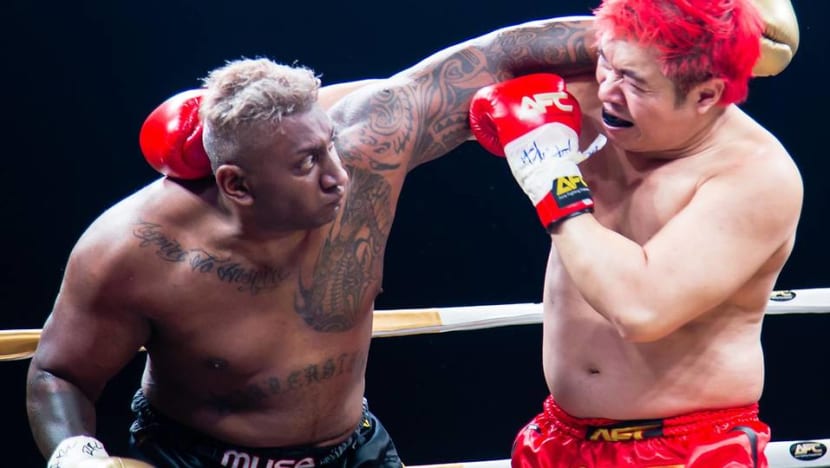Muay Thai fight death: Pradip Subramanian had underlying heart conditions that likely led to cardiac arrest

Pradip Subramanian (L) faces off against Steven Lim during their Asia Fighting Championship (AFC) match at Marina Bay Sands. (Photo: Facebook/Asia Fighting Championship)
SINGAPORE: Bodybuilding champion Pradip Subramanian, who died after a celebrity Muay Thai match with YouTuber Steven Lim in 2017, had underlying heart conditions that placed him at a high risk of cardiac arrest, a coroner's court heard on Monday (Dec 30).
Mr Pradip, the former World Bodybuilding & Physique Sports Federation (WBPF) Singapore president, died aged 32 after taking on Mr Lim, then 41, in a headline celebrity fight at Marina Bay Sands on Sep 23, 2017.
READ: 'He died doing something he loved': Friends pay tribute to late bodybuilder Pradip Subramanian
He had two underlying heart conditions that were unknown to him, an autopsy report prepared by the Health Sciences Authority (HSA) showed.
A senior consultant specialising in cardiology took the stand and referred to the HSA report stating that Mr Pradip had the two conditions predisposing him to a high risk of cardiac arrest.
Mr Pradip had "a bad heart", with conditions working against him, and his chances of survival were "extremely poor", said Adjunct Associate Professor Tong Khim Leng.
Among his conditions, Mr Pradip had an enlarged heart and pre-existing cardiomyopathy, a disease of the heart muscle that can lead to heart failure.
He also had a mutant variant of a gene associated with a condition known as Long QT syndrome 1, an inherited disorder of the heart's electrical activity that is associated with sudden cardiac death.
The condition is associated with certain triggers, with Assoc Prof Tong giving her expert opinion that Mr Pradip suffered a cardiac arrest because of the underlying heart conditions.
"We know that Long QT Syndrome 1 is triggered by severe exertion and emotion ... and we know that this (was) a celebrity match, there's a lot of tension on him," she said.
She said the extreme situation and adrenaline surge could have contributed in triggering the cardiac arrest.
She said that while habitual training can reduce the risk of sudden cardiac arrest, someone with underlying heart conditions still face a risk, explaining that that is why marathoners can run races and feel fine but collapse on their last race as conditions change each time.
Assoc Prof Tong also gave her view that the medical attention given to Mr Pradip was adequate and timely, and dismissed the suggestion that giving him oxygen a few minutes quicker would have helped his chances of survival.
According to Mr Pradip's family lawyers Sunil Sudheesan and Diana Ngiam, Mr Pradip's father said he never saw any oxygen mask placed on his son.
Two paramedics who took the stand said Mr Pradip had been given oxygen a few minutes after he was taken from the side of the ring. They testified that he appeared weak and had trouble standing, but was conscious and responsive until he was in the ambulance.
READ: Friends and family pay last respects to Pradip Subramanian
OXYGEN WOULD NOT HAVE HELPED OUTCOME MUCH: EXPERT
Assoc Prof Tong said that while giving oxygen would help mitigate tissue hypoxia or the deprivation of oxygen to the tissue, "if the heart decides to give way, no matter how much oxygen you give, it's not going to revive the heart".
Instead, what determines survival includes the use of an Automated External Defibrillator (AED), underlying cardiac conditions, and cardiopulmonary resuscitation (CPR).
CPR is to be given only when there is no pulse, she said, and an AED is automated, so the machine could not be fired for Mr Pradip as he was asystolic - a cardiac arrest rhythm with no discernible electrical activity on the EKG monitor.
"Just looking at the autopsy, his chances of survival (were) extremely poor," she said. "Even if he got oxygen immediately, honestly I think it's not going to change his outcome."
SPORTS SAFETY RECOMMENDATIONS COULD BECOME CODE OF PRACTICE
Muay Thai is categorised as a high-risk sport with a high cardiovascular risk and contact or collision risk, said Adjunct Associate Professor Benedict Tan, chairman of the Sports Safety Committee.
He told the court that Sports SG had issued a Sports Safety Committee report in March this year covering topics including sudden cardiac death.
Recommendations in the report, which are expected to be turned into a code of practice that will apply to any sports event in Singapore, state that athletes must be able to recognise warning symptoms of sudden cardiac arrest.
They should also understand how to minimise this risk and be prepared to respond accordingly.
According to the report, sports-related sudden cardiac arrest or death in athletes under the age of 35 is usually associated with underlying heart abnormalities, while the major cause of sudden cardiac arrest in athletes above 35 is coronary artery disease.
Athletes with positive family history of premature heart disease or cardiac death, or hereditary cardiac conditions, should seek cardiac clearance before taking part in sports or competitions.
This includes those with family history of specific hereditary heart conditions such as long QT syndrome or hypertrophic cardiomyopathy.
The hearing on Monday, the second day into the coroner's inquiry, was attended by members of Mr Pradip's family.
State Coroner Kamala Ponnampalam said she would review the evidence heard so far, with findings to be delivered at a later date.














